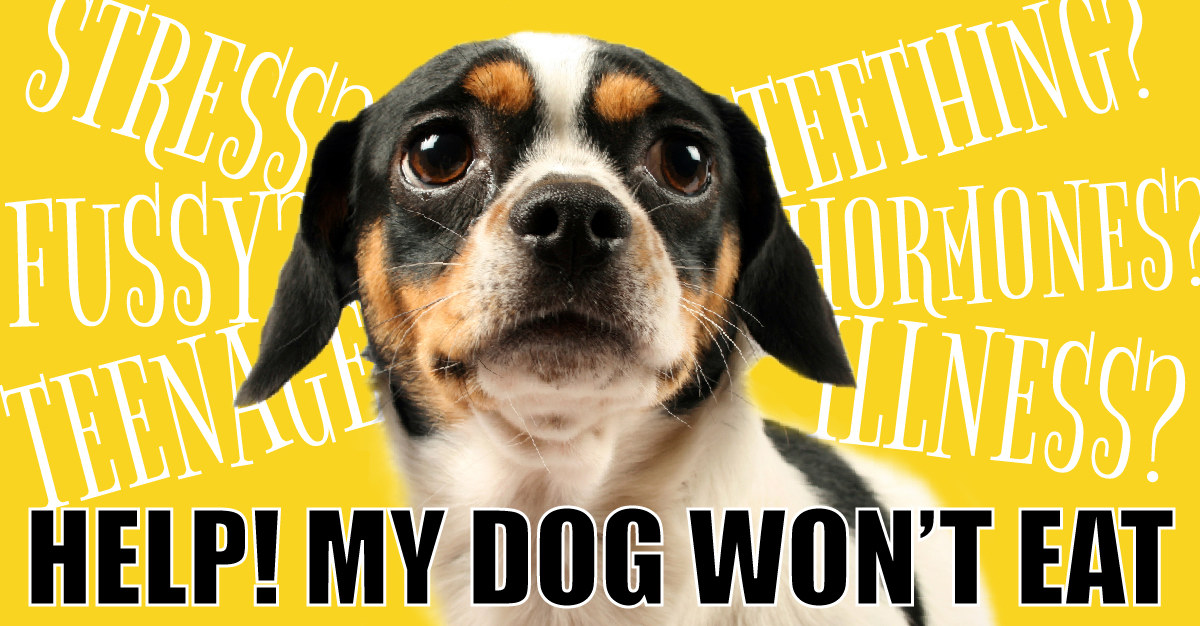Help! My dog won’t eat!

Dogs at times seem to go off their food. We help many people with this issue but often the reasons for it are quite simple.
Dogs go through phases which can mean that food is left and there seems to be no interest. It’s even worse when you feel you need to resort to tinned foods.
It’s important to remember that for a healthy dog there is no issue with skipping a meal.
The first thing to do though is to check the teeth, rule out any issues with dental problems. Secondly, check you are not overfeeding. Some dogs self-regulate what they need and leave what they don’t.
Possible Reasons
1. Teething
Dogs lose their baby (puppy) teeth to get a nice shiny set of teeth.
The timing of this is can depend very much on breed and size of your dog but two months old upwards is generally when dogs start teething.
Teething can be painful, and gums might feel sore with teeth themselves rather wobbly.
Some puppies struggle with meaty bones so you might be better off with a puppy food.
It can help to give some teething toys or something frozen to cool down the painful gums.
A good idea can be to soak an old tea towel in some broth (homemade without salt), wring it out, tie a knot in it, freeze and give frozen.
Always keep an eye on your puppy when giving treat toys like this - it’s good to chew on (but not to eat!).
Other good alternatives are a frozen carrot or cucumber or try serving food a little colder.
2. Hormones
Female dogs can get their first season from around the age of 6 months. With coming into the season there will be physical changes, sometimes a raised temperature, behavioural changes as well. Hormones flying around in the body can make girls really go off their food, it’s very normal. The same is the case for bitches in pregnancy and having a phantom pregnancy.
Sometimes adding a few yummy toppers can help- try mixing in some coconut oil or lukewarm bone broth or lukewarm goats milk (as a treat it’s fine). Even crumbling up some dried sprats and mixing it can help – be creative.
If your bitch is really struggling and losing weight then look into the herb raspberry leaf.
3. Illness
Dogs who are ill do at times self-fast to instinctively clean and detox their system. Make sure you keep them well hydrated and perhaps offer tripe with some lukewarm water. This is also a great solution for dogs after an operation; it’s bland, mild and smells very appetising to your dog!
4. Teenagers
It’s extremely common to hear of dogs starting to get fussy with their food between the ages of 6 months to 13 months. If you have ruled out possible teeth or hormone issues then your dog could just be acting like a teenager!
If you feed 3 times a day switch it to 2 times a day and importantly don’t allow for grazing or a lot of treats. Serve yummy food, if no interest, just remove the bowl and serve it next feeding time.
5. Big life changes
Dogs like routine, so big life changes will impact as they can cause stress, which in turn can mean a decreased appetite. Changes like the loss of a loved one (2 or 4 legged), a family move (rescue or puppy), new additions to the family, holidays etc can all bring real insecurity to a dog. Be patient and allow for time to settle things down.
Pit Falls
Unless you are dealing with very young puppies, ill dogs or a dog losing a lot of weight, there is no issue with skipping a meal. Your dog will probably prefer kibble or tinned foods (for the salt and sugar it contains). This is why they love eating it – it’s a little like getting a McDonalds Happy Meal – products like these are made to appeal and millions of pounds [find out more] are spent on it to make it so it’s hard to resist from eating. Once you do start this route then re-introducing a fresh and raw diet is even harder, as it’s not addictive.
Real fussiness is a learned behaviour, it is counter-intuitive. Try not to entertain it as the more you switch and swap and offer menu options the more fussiness you can expect.
Other things to consider…
Some dogs might go off their bowls or dining location and not food! If you, for example, dropped the bowl and it made a terrible noise your dog might feel scared of it. Equally, if a nice dinner time was rudely interrupted or something scary (to your dog) happened, he/she might associate the bowl or location with stress.
Dogs are extremely sensitive to YOU, if you are starting to stress, feel frustrated every time you serve dinner (or even watch over the bowl) your dog will pick up on this which will re-enforce that dinner times are STRESSFUL, this of course not being conducive to eating.
Take the stress and worry out of the equation; this is so important.
If your dog doesn’t want to eat a new food, try small introductions first.
If still no luck it could just be he/she simply doesn’t fancy that particular meat… which is fine!
Remember
Dinner times should be enjoyable, without stress, without competition if you have other dogs. Allow your dog to eat at their own pace and in peace – even if this means splitting up dogs if you have multiple creatures in your household.
If your dog stays off their food, is losing weight and you are concerned then do visit the vet.




